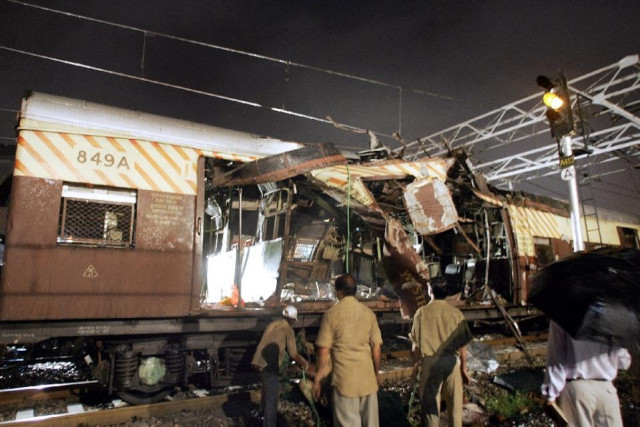Revenge for Gujarat riots: Mumbai court convicts 12 over deadly train blasts
Explosions ripped through the suburban trains during the evening rush hour in July 2006

The 12 men were convicted of murder, conspiracy and waging war against the country over the coordinated series of attacks during the evening rush hour in 2006 that killed nearly 200 people and injured more than 800. PHOTO: AFP
The men were convicted of murder, conspiracy and waging war against the country over the coordinated series of attacks during the evening rush hour that also injured more than 800 people.
The Press Trust of India news agency said the Mumbai sessions court had acquitted one person and convicted 12 after a trial that has lasted nine years and concluded on August 19 last year.
Sentencing will be on Monday and prosecution lawyer Raja Thakare said he wanted "the strictest possible punishment" for those convicted.
"Whatever sentence the judge hands out, it should be able to satisfy the public at large," he told AFP by phone.
Lawyer Shahid Nadeem, who represented all 13 defendants in the case, said the prosecution had failed to provide evidence that Abdul Wahid Shaikh, who was acquitted, had played any role in the blasts.
He said he would appeal against the convictions of the other 12.
"We are not satisfied with the judgment and will approach the High Court against the convictions," he said.
In all, police charged 30 people over the bombings, including 13 Pakistani nationals, who along with four Indian suspects have yet to be arrested.
Seven blasts ripped through the suburban trains during the evening rush hour in July 2006.
The bombs were packed into pressure cookers then placed in bags and hidden under newspapers and umbrellas in the trains.
Prosecutors said the devices were assembled in Mumbai and deliberately placed in first-class coaches to target the city's wealthy Gujarati community.
They said the bombings were intended as revenge for the riots in the western state of Gujarat in 2002, which left some 2,000 people dead, most of them Muslims.
Prosecutors accused Pakistan-based militant group Lashkar-e-Taiba of being behind the 2006 attacks, although a little known outfit called the Lashkar-e-Qahhar claimed responsibility.
Over the course of the nine-year trial, the court examined nearly 250 witnesses.
The accused were represented by Shahid Azmi, a rights activist and lawyer, who was mysteriously killed by unidentified gunmen in 2010.
The attacks prompted India to freeze peace talks with Pakistan for several months.
Dialogue between the nuclear-armed nations resumed later that year, but was interrupted again in 2008 after a militant attack on Mumbai that left 166 people dead.
Published in The Express Tribune, September 12th, 2015.



















COMMENTS
Comments are moderated and generally will be posted if they are on-topic and not abusive.
For more information, please see our Comments FAQ